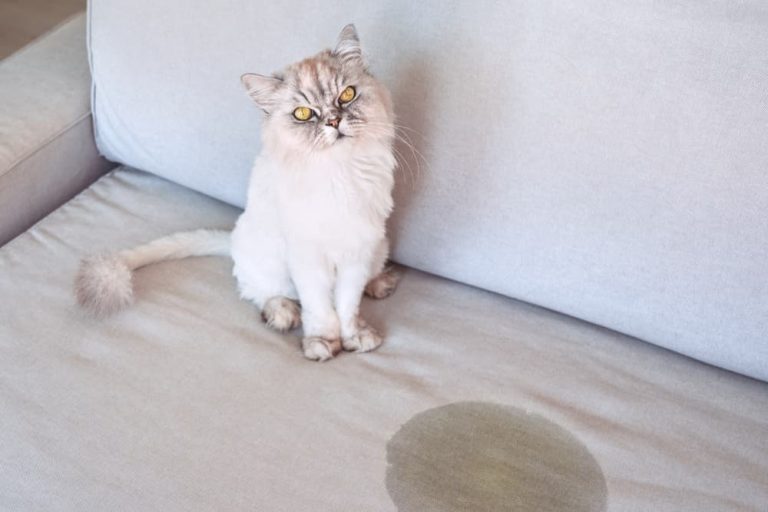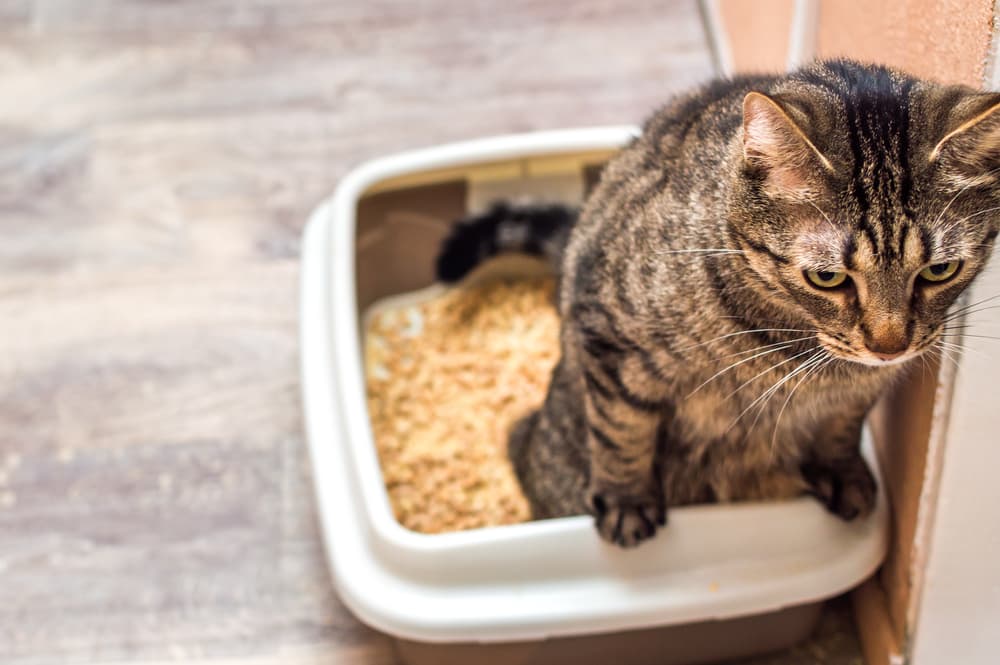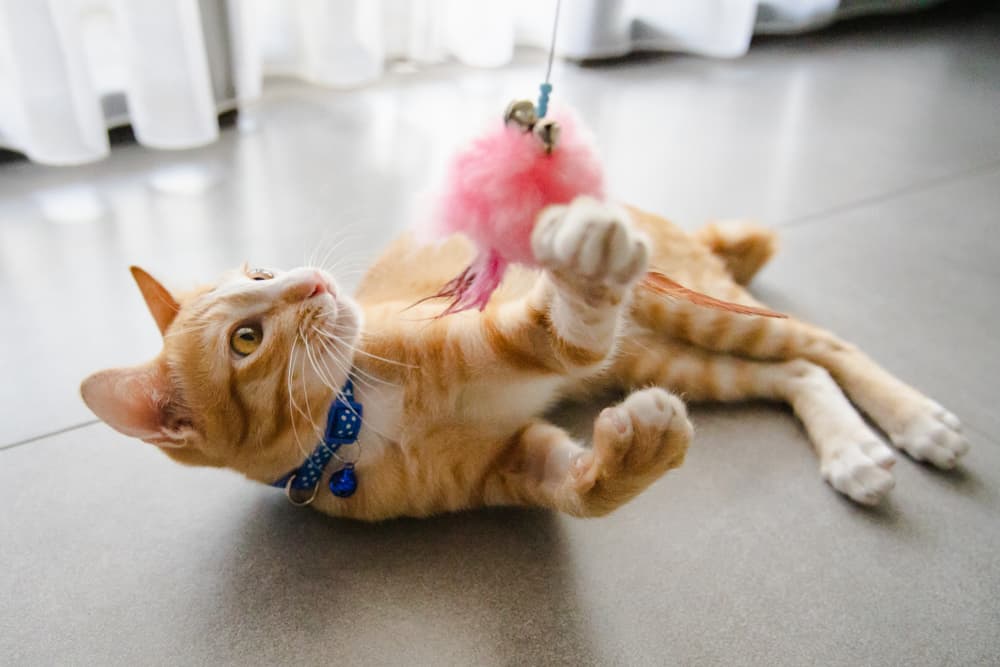Cat Peeing Everywhere: 10 Tips to Address the Mess

You may love everything about your cat, but if you find yourself frequently asking, Why is my cat peeing everywhere?, you’re probably feeling a certain level of frustration. Cat pee can be tough to clean, and even when you do manage to get the stain out, that pungent smell seems to never go away.
With insights from veterinarians, we help explain what may be motivating your cat’s behavior, then offer solid tips to help you address it. We’ve also added proven cleaning tips so you can spend more time bonding with your cat instead of worrying about messes. Always check with your veterinarian for recommendations and to get a proper diagnosis.
Why Is My Cat Peeing Everywhere?

There are a number of potential reasons that may explain why your cat keeps peeing everywhere, from behavioral and medical issues to an uninviting litter box. Here are a few common causes.
The Litter Box is Not Up to Your Cat’s Exacting Standards
If the litter box is dirty, your cat will likely not use it. “Cats prefer freshly ‘flushed’ litter boxes similar to how people like to use restroom stalls that have been flushed by the previous user,” says Dr. Ashley Barnes, medical director at Louisville Family Animal Hospital in Louisville, Colorado.
A cat might also hesitate to use a litter box that’s too small and cramped, is hard to climb in and out of, is uncovered (or covered), is in a noisy location, or contains off-putting litter.
I Moved and Now My Cat is Peeing Everywhere
Anything that deviates from a cat’s normal routine can cause anxiety. “This can be stress from another animal or kids in the house, stress from moving, having work done on the house, not enough perceived resources, or change in routine, or not enough or dirty litter boxes,” says Barnes. Even being overly affectionate with a cat can cause stress, as can boredom and loneliness.
The Cat Has a Medical Condition

Here are a few your veterinarian might want to check for.
- Urinary Tract Infection (UTI): A UTI is a bacterial (and sometimes fungal) infection that develops in the urinary system. It creates inflammation, which in turn causes pain and urgency, says Barnes. “When cats have pain on urination, they tend to associate this with the litter box and will go elsewhere in an effort to make urination more comfortable.”
- Feline Idiopathic Cystitis (FIC): FIC is a recurring bladder inflammation usually caused by stress or low water intake. It’s most common in young and middle aged cats. “The inflammation causes pain and urgency similar to a urinary tract infection.”
- Urinary Stones: Urinary stones develop in the urinary system when the minerals contained in urine clump together (1). “Stones cause inflammation which causes pain and urgency, as seen with UTIs and FIC,” says Barnes.
- Diseases That Increase Thirst: A cat who drinks too much water may not make it in time to the litter box, says Barnes. “Or they may use the litter box so much it becomes too ‘dirty.’” Examples of diseases that cause increased thirst, says Barnes, are kidney disease and diabetes mellitus.
Other diseases linked to a cat peeing everywhere include hyperthyroidism, inflammatory bowel disease, cancer, and heart disease, says Dr. Katie Pagan, a partner veterinarian with Heart + Paw in Fells Point, Maryland.
Your Cat is a Senior
An old cat peeing everywhere may be suffering from chronic pain associated with arthritis. “If a cat has arthritis in their hips, lower back, and/or stifles (knee joints), this can make it painful to get into the litter box and/or posture,” says Barnes.
Bladder tumors, which Barnes says usually occurs in older cats, can also cause urinary difficulty. “Depending on where the bladder tumor is, it can either obstruct part of the tract making it more difficult to pee but can also cause pain.”
Do Cats in Heat Pee Everywhere?
Some female cats in heat may pee more frequently or spray smaller amounts of urine on specific areas around the house. This is because cat pee contains pheromones and hormones, which females use to signal their availability to males (2). It is also common for unneutered male cats to urinate in the house.
Cat Peeing Everywhere: 10 Tips to Address the Mess

If you’d like to know how to get your cat to stop peeing everywhere, the following tips might help. The best person to talk to about your cat’s individual urinary issues is, of course, your veterinarian.
Rule Out Any Medical Issues
If your cat pees everywhere but the litter box, the first step is to consult with a veterinarian. “This can include a physical exam, urinalysis, imaging of the bladder or joints, and/or blood testing,” says Barnes. Treatment will depend on the diagnosis. “This can include antibiotics for UTIs, pain medication for FIC, bladder stones and/or arthritis, prescription diet for stones and/or FIC,” Barnes adds.
Maintain Yearly Veterinary Appointments
Yearly checkups are important for catching issues early on, says Pagan. “I always recommend yearly blood work for my feline patients and even will perform this twice a year for my older patients. Frequent vet checks are imperative to catch issues early. I will always run a full urinalysis as well if an owner states that a cat is peeing outside of the box. Your veterinarian may also order X-rays to rule out any underlying diseases.” And, of course, when in doubt, schedule a veterinary appointment ASAP.
Keep a Spotless Litter Box

Not only is a clean litter box more enticing to a cat than a dirty one, it also lessens his risk for developing feline lower urinary tract disease (FLUTD).
To maintain a clean box, “A cat’s litter box should be scooped daily and litter should be replaced once weekly,” Pagan recommends.
Keep the Litter Box in a Stress-free Area
Keeping the litter box in a quiet area could help your cat feel more secure. “Make sure the litter boxes are not next to noisy machines such as a washer and dryer, and not in high traffic areas. We all want a little privacy to pee,” says Barnes. Pagan also recommends not relocating litter boxes too often.
Provide Additional Litter Boxes
One litter box isn’t enough, even if you have just one cat. “The general rule of thumb is the number of litter boxes should be the same as the number of cats plus one. So if you have two cats, you should have three litter boxes,” says Barnes. They should also be kept in separate locations, she says. “Two litter boxes next to each other look like one litter box to the cat.”
Rethink Your Litter
Though there are a variety of types of litter on the market, cats tend to like theirs unperfumed and soft, like that of clumping clay litter. This isn’t a hard and fast rule, so you might have to try out different types before finding one your cat approves of. Also, “Stay consistent as well with the type of litter you buy,” adds Pagan.
Consider using a product like Cat Attract Litter or Cat Attract Litter Additive, says Barnes. “This is pheromone-impregnated litter that makes cats want to urinate on it.”
Provide Your Cat With Regular Enrichment

The more resources a cat has, the less stressed they will be, says Barnes. These resources, she says, include an adequate number of water bowls, high perches, scratching posts, and toys. “Again, you want to make sure they are in different locations if there are more than one cat in the household. Play sessions daily also help with environmental enrichment which decreases stress.”
Manage Your Cat’s Stress Levels
Given that stress can lead to a cat peeing everywhere, it’s beneficial to keep his anxiety at bay. Investigate and correct potential stressors, whether it’s originating from another pet or person or is tied to a recent move or inadequate resources.
Another option is to use a pheromone diffuser, says Barnes. “This is a synthetic pheromone that is anti-anxiety to cats. The diffuser should be in the room the cat spends the most time in.”
Give Your Senior Cat Extra TLC
For cats with arthritis who may have trouble getting around, place at least one litter box on each level of the house where they spend time so they can avoid climbing stairs, recommends Barnes. “You can also purchase a low-profile litter box or cut a square in the litter box so the cat doesn’t have to climb in.”
Encourage Water Intake
The more water a cat drinks, the more dilute their urine will become, says Barnes. “This can help in preventing medical causes such as UTIs, FIC, and bladder stones. More dilute urine is also less irritating to the bladder.”
If you use water bowls, keep several in different locations, says Barnes. “Some cats prefer fountains. If your cat prefers a dripping faucet, you can place a container to collect the water not drunk to use to water plants.” Another way to increase water intake, she says, is to feed your cat canned cat food.
Cleaning Up When Your Cat Keeps Peeing Everywhere

When it comes to cleaning up cat pee, it’s essential to think in terms of eliminating the odor as well as the stains. If your cat keeps peeing in the same spot, it’s likely because he smells proteins in the urine that act as a cue to mark territory.
So what can you use to remove both the stain and odor that originates from cat pee? “If your cat does have an accident, my favorite type of cleaner to use is an enzymatic stain and odor eliminator,” says Pagan.
Veterinarians recommend enzymatic cleaners because they break down stains and odors instead of just hiding them, and because they can be used on a variety of surfaces. They also don’t contain harsh chemicals, and instead rely on beneficial bacteria to break down organic matter for their food.
Veterinarians also recommend investing in a good black light, an ultraviolet light that makes it easier to spot cat pee.









